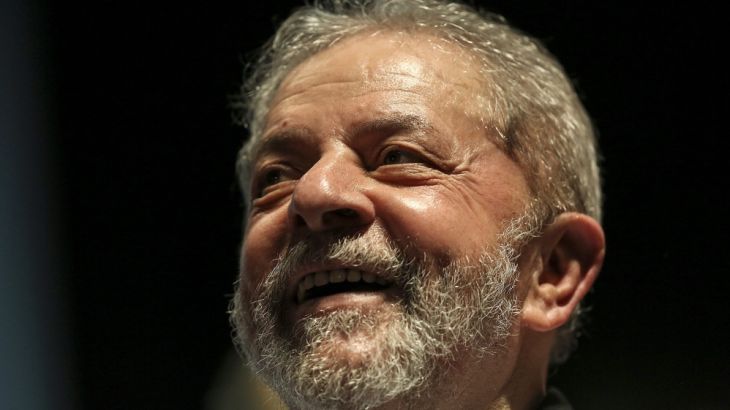
Lula da Silva: We will emerge from the crisis stronger
Brazil’s former president discusses his support for embattled President Rousseff and why he’d be PT’s next candidate.
Editor’s note: This interview was conducted and first aired in June 2016.
Luiz Inacio Lula da Silva, the impoverished son of illiterate farmers, rose to become not just the president of the world’s seventh largest economy, but the man who catapulted Brazil onto the global stage as no one ever has.
Keep reading
list of 4 itemsBolsonaro, ‘gender ideology’ and hegemonic masculinity in Brazil
A president in prison won’t solve the crisis in Brazil
Netflix series on Brazil’s corruption exposes political divisions
US President Barack Obama called him the world’s most popular president. Newsweek, Le Monde and the Financial Times dubbed him the world’s most influential president.
What I'm telling Dilma is: Dilma, when you have economic problems, when the crisis is enormous, the only one thing that can save a country is the people of that country. And who will save Brazil's economy once again are the poor people of this country.
The former trade union leader who lost a finger working at a metal factory at age 14, is the only Brazilian president to never have gone to university. Yet, even his adversaries recognise that his political skills are unparalleled.
Elected in 2003, the leader of Brazil’s left-wing Workers’ Party, or PT, embraced both George Bush and Hugo Chavez, determined to assert Brazil’s place in the Americas and beyond.
While he played by market rules during his two-term presidency, Lula da Silva catapulted tens of millions of impoverished Brazilians into the lower-middle and middle classes, through unprecedented social programmes that won him praise worldwide.
While corruption allegations dogged his party from the start, he left the presidency in 2010 with an historic 80 percent approval rating.
The trajectory of his chosen successor, his former cabinet chief, Dilma Rousseff, has been vastly different. Many said early on she didn’t have the political skills of her predecessor.
She now faces an impeachment amid an unprecedented economic and political crisis.
Revelations of a billion-dollar corruption scheme in the state-owned oil company Petrobras while Lula da Silva was president have eroded the legacy of the so-called “Teflon” leader. In March, police detained him for interrogation on suspicion of money laundering, just one of several corruption allegations against him.
Al Jazeera visited Luiz Inacio Lula da Silva at his Sao Paulo foundation, The Lula Institute, which focuses on social equality and economic development, furthering the policies he pursued during his presidency. Al Jazeera’s Lucia Newman spoke to Brazil’s former president about his own legal battles and his key role in trying to save Rousseff from impeachment.
He discusses why the PT needs to return to its roots – as a party envisioned to reshape Brazilian politics – and the Petrobras corruption scandal and his connection to it.
“I have peace of mind, and I doubt that any prosecutor or police delegate in this country is more honest or more ethical than me,” he says.
Da Silva believes Rousseff is a victim of the “elite, the right-wing of Brazil” whose capabilities, he says, they underestimated.
“There is widespread hatred for the Workers’ Party and the government,” he says.
He takes stock of Rousseff’s presidency, saying he wishes 2015 simply did not happen.
Looking back on the advice he has given Rousseff, da Silva says: “I told Dilma that when I was elected president, I could not afford mistakes. Because if I did, no worker would ever become president again.
“I told Dilma, ‘You can’t make mistakes. You have to do things right because you are the first woman president of Brazil. So, you have to show that women have more skills, that women can govern even better, that a woman knows how to be a politician.'”
Da Silva says many of his fellow PT members and friends from other parties called it “madness” when he named Rousseff, who lacked political experience, as his successor. He says he told them: She’ll learn.
“Because politics is not more than building personal ties, talking to people, listening to them, knowing how to co-exist with your opponents. That’s democracy, living democratically in diversity.”
In his opinion, the crisis has given Rousseff her best moment, because she has been forced to speak to people. He also believes that this is an advantageous political opportunity for Rousseff to avoid impeachment.
“Because our society is beginning to understand that kicking her out was not democratic. People who took to the streets to criticise our president and government, are not out on the streets defending Temer. In opinion polls Temer has higher disapproval than Dilma. Temer has managed to put together a government that’s very, very, very inferior to what his allies expected.”
If she survives the impeachment, Lula da Silva says it’s imperative for Rousseff to change track and make new commitments to the Senate and to Brazilian society.
Da Silva, who is 70, is unequivocal when he says that he will not allow the social reforms realised under his presidency to be destroyed, and if necessary, he is willing to be the next PT presidential candidate.
“If I am the person who can prevent them from destroying the social reforms achieved in this country, I won’t think twice about running again. No doubt.”
You can talk to Al Jazeera too. Join our Twitter conversation as we talk to world leaders and alternative voices shaping our times. You can also share your views and keep up to date with our latest interviews on Facebook.